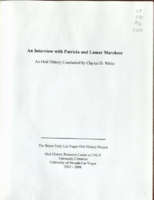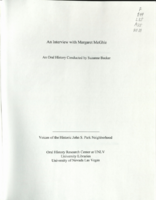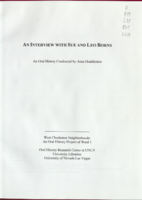Search the Special Collections and Archives Portal
Search Results

Floyd Jenne interview, 1996: transcript
Date
Archival Collection
Description
Jenne discusses his birth in Ogden, Utah in 1915, his early life in Northern Nevada in 1920s, and his later life in Boulder City, Nevada working as a reclamation ranger for the Bureau of Reclamation. Jenne begins the interviews discussing his work as a steel foundry worker and miner in McGill, Nevada, studying forestry, and enlisting in the Civilian Conservation Corps at Utah State University in 1934. Jenne then describes his experiences moving to Boulder City and working as a reclamation ranger. Other topics Jenne covers include providing security for notable Boulder City and Hoover Dam (Boulder Dam) visitors and patrolling the area. Lastly, Jeanne talks about the Boulder City Junior Chamber of Commerce, Boulder City's incorporation, and Boulder City law enforcement.
Text

Transcript of interview with Carl F. Kelley by James M. Greene, May 2, 1972
Date
Archival Collection
Description
On May 2, 1972, James M. Greene interviewed Carl F. Kelley (born May 19th, 1922 in Ohio) about his life in Southern Nevada. The two talk about how Kelley first moved to Nevada and his original addresses. Kelley describes living in Boulder City, Las Vegas, and Henderson. The interview concludes with an in-depth discussion of the Civilian Conservation Corps activities in Boulder City, Nevada.
Text

Transcript of interview with Phyllis Webb Clark by Lorna Suzette Clark, April 7, 1976
Date
Archival Collection
Description
On April 7, 1976, Lorna Suzette Clark interviewed her mother-in-law, Phyllis Webb Clark (born 1928 in Los Angeles, California) about her experiences from living in Las Vegas. The two first discuss education, the various address at which Phyllis lived, and the early development of the Strip and Downtown areas. The interview then covers the visits of important individuals, forms of transportation, the effect of World War II on the economy, and the effects of the growing town on hospitality and courteousness. Phyllis also mentions the Helldorado Parade, her involvement in Boy Scouts and Girl Scouts, and recreational activities. The interview concludes with a discussion on the atomic testing, the Stewart Ranch, and floods in Las Vegas.
Text

Transcript of interview with Oliver Crickman by William Hawley, March 3, 1979
Date
Archival Collection
Description
On March 3, 1979, William Hawley interviewed Oliver Crickman (born 1933 in Apex, North Carolina) about his experiences from living in Nevada and working in restaurants. Crickman first describes his background and his first occupations prior to starting as a cook in Las Vegas restaurants. He then explains how he gradually moved from the position of cook’s helper to sous chef and his then-current position of executive chef at the Royal Inn. Crickman goes into detail about the operation of those restaurants and other Las Vegas Strip and Downtown Las Vegas properties, and he describes the demographics of cooks as well as how the hospitality industry has changed over time. The latter part of the interview involves a discussion of Crickman’s various residences in Las Vegas over time, the extent of crime, the first places to shop, and a brief discussion on mobile homes.
Text

Transcript of interview with Ruth and Jake Dieleman by James M. Greene, November 15, 1974
Date
Archival Collection
Description
On November 15, 1974, James M. Greene interviewed Ruth Dieleman (born 1908 in Searchlight, Nevada) and her husband Jake Dieleman (born 1904 in Axel, Netherlands) about their lives in Southern Nevada. Ruth first talks about her life in Searchlight while growing up, her experience as an educator, and her various residences in Southern Nevada. Jake first talks about his immigration into the United States and his eventual move to Nevada to get into construction rigging for the building of Hoover Dam. He discusses his work as a rigger in detail but also discusses his work on various Las Vegas casinos as well as his work in the state legislature.
Text

Transcript of interview with Pat and Lamar Marchese by Claytee White, January 16, 2008
Date
Archival Collection
Description
Pat Marchese grew up in Johnston, Pennsylvania, and Lamar was reared in Tampa, Florida. Pat was raised on a farm surrounded by relatives. Lamar takes pride in his mother heritage, which can be traced to Tampa Bay, Florida, in the early 1840's. Pat and Lamar graduated from the University of South Florida and relocated to Las Vegas in 1972. Pat's remarkable 30-plus year passion includes working for the city of Las Vegas and Clark County, Nevada. She created numerous art and cultural programs which consist of the Civic Symphony, Charleston Heights Arts Center, Rainbow Company Theatre, along with consulting work for the Allied Arts Council. In addition, to her creating art and cultural agendas, she became a budget analyst and chief lobbyists for the county, testifying before the Senate Taxation Committee. She implemented through the public arts program, a Mural Arts Series, the Parks and Recreation Cultural Division, and culture on the Strip. Pat executed the grant that ensured the necessary funding for the expansion for public broadcasting radio stations throughout California, Utah, Arizona and Nevada. She's certainly worthy of her title "Queen of Las Vegas Culture". Lamar's amazing 30-plus year's calling comprises putting into action an abundant number of libraries programs for the State of Nevada along with establishing the first public broadcast radio station in Nevada. His library accomplishments include merging the City's libraries branches, library programs, shows, concerts, unification of academic libraries and public libraries and the first reciprocal borrowing agreement for the State of Nevada with the Nevada library card. He consolidated Las Vegas Libraries and the Las Vegas Clark County Library District. He also sold bonds for the development of future libraries. Lamar's broadcasting achievements consist of incorporating the Nevada Public Radio Corporation with State of Nevada, serving as Chairman of the board for NPRC, constructing broadcasting translators and radio stations throughout the tri-state and enveloping the State of Nevada through public broadcasting. Combined, Pat and Lamar Marchese have served the Las Vegas community for over six decades. Thanks to the Marcheses, broadcasting is thriving throughout the tri-state area, libraries are blossoming and cultural programs are flourishing. They are looking forward to retiring, traveling, spending time with loved ones, and most of all, Pat and Lamar time together.
Text

Transcript of interview with Margaret McGhie by Suzanne Becker, November 21, 2008
Date
Archival Collection
Description
Margaret McGhie was a Depression era child who grew up in western Nevada, where her grandparents were ranchers. Her mother, a native Nevadan, married an Italian immigrant, and she recalls moving a lot. Margaret attended a business college in Reno and eventually moved to Las Vegas, where she worked for Basic Magnesium (BMI) in Gabbs, NV and then later for a remanufacturing company where she verified rocket measurements. Only 16,000 people resided in Las Vegas in post World War II days when she moved there for work as her husband returned from military service. At the time lots for homes were selling in the new development of John S. Park. Using the GI bill the young couple became one of the first home owners on the street. The land had formerly been a ranch and orchard making it a beautiful spot. Due to post-war building material shortages it took nearly two years to finish the house construction. To this day Margaret lives in the home where she and husband raised four children. She recalls the neighborhood fondly and describes some of the activities that kept them busy, where they shopped, and how her children attended John S. Park Elementary School and then the local parochial schools. She describes how the town changed from a 10-minute cross-town drive and how the fact of living close to the Strip had little impact on their life. People moved from the neighborhood as the city grew, she says, moving to newer and nicer homes in Spanish Oaks and then Summerlin. The John S. Park neighborhood has changed from a formerly large Mormon demographic to a notable increase of Latino population. She sees the historic designation as a signal of pride in ownership for residents.
Text

Transcript of interview with Leo Borns and Sue Easley Borns by Anna Huddleston, March 21, 2014
Date
Archival Collection
Description
Leo and Sue (Easley) Borns came to Las Vegas in 1962 to begin an architectural career that would last forty-four years in Southern Nevada. Leo Boms worked for various firms in Las Vegas before developing a reputation as "F. Borns, Architect". He has gone on to design buildings for state public works, Clark County, the City of Las Vegas, Clark County School District, churches, and private home owners. Rarely taking a job outside of Southern Nevada, Leo Boms' intent was to develop an architecture considered indigenous to the area while keeping the conservation of energy and technology as prime importance. Mr. and Mrs. Boms, after living in the area for approximately five years, decided to purchase a home on Strong Drive in McNeil Estates where they raised their three children. Active in social and philanthropic organizations, both Leo and Sue have become acquainted with numerous area personalities. Mr. Boms is most proud of being a part of the development of the Kiwanis Water Conservation Park although his structural designs can be seen throughout the Southern Nevada area. At the age of 77, he closed his office but remains an integral influence on the Greater Las Vegas area.
Text

Transcript of interview with Dennis Ortwein by Claytee White, May 6, 2009
Date
Archival Collection
Description
Dennis Ortwein arrived in Las Vegas in 1956. He shares many details about growing up in Montana, his parents and siblings, his education, and the moment in time when he was offered an opportunity to work in Las Vegas. He also lays out the path his singing career took, starting with school plays, duets with his sister, and high school quartets. Once in Las Vegas, Dennis taught for a while, served as principal, and was involved in creating programs that helped integrate schools. He also talks about his church choir work, entertainment in early Las Vegas, above-ground testing at the Nevada Test Site, and anti-nuclear protests. Dennis served as lab school and student teaching coordinator in Nigeria. He offers several anecdotes and stories about the time he and his family spent there. After retiring early (age 53), Dennis acted as consultant to the Esmeralda County school board, executive director for the National Conference of Christians and Jews, and wrote a book. He is currently enjoying his singing career by appearing at conventions, in musicals, and at weddings and memorials.
Text

Transcript of interview with Ashley Hall by Claytee White, September 2, 2015
Date
Archival Collection
Description
Ashley Hall was born April 3, 1943 in Caliente, Nevada. After high school, he worked for the Union Pacific Railroad at the Nevada Test Site as a cashier and as a signalman. He later attended Brigham Young University and the University of Nevada, Reno. After college, Hall served the City of Las Vegas in significant ways. Notably, as City Manager he was instrumental in the initial development of Summerlin, Nevada. Though he has retired from local politics, he remains active as the President of the Old Spanish Trail Association and as the U.S. Army Reserve Ambassador.
Text
